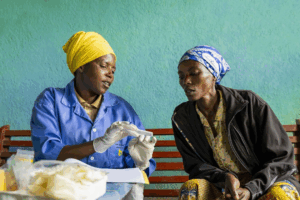
Orbis International‘s Flying Eye Hospital landed at Kigali International Airport for the first time in the organization’s history, marking Rwanda as the 84th country to host the airborne medical facility. The two-week mission, running from July 21 to August 1,2025, represents the culmination of nearly a decade of partnership between Orbis and the Rwanda International Institute of Ophthalmology (RIIO).
The initiative addresses a critical gap in Rwanda’s healthcare landscape: with only 30 ophthalmologists serving 13 million people—just 2 per million compared to 52 per million in the United States—specialized eye care remains largely concentrated in referral hospitals. Of the country’s 42 district hospitals, only seven have a full-time ophthalmologist, and 30% of patients requiring cataract surgery cannot access care due to distance.

The Flying Eye Hospital operates as both a fully equipped surgical suite and teaching facility. Inside the converted MD-10 aircraft, a 46-seat classroom allows local medical professionals to observe live surgeries through cameras mounted in operating microscopes, with real-time audio communication between observers and surgeons. The first week focuses on simulation training using virtual reality tools and high-fidelity mannequins, while the second week proceeds to live surgical training in four specialties: cataracts, oculoplastics, strabismus, and medical retina.

Dr. Ciku Mathenge, RIIO’s founding director and Orbis’s medical adviser for Africa, emphasized the program’s comprehensive approach. As she told The Summit television program: “We are training not just the eye doctors but training the entire team. So when we as eye doctors are managing a patient we need sometimes somebody to give anesthesia we need the nurses who support us in the eye theaters.”
The mission builds on Orbis’s existing technology initiatives in Rwanda, including their Cybersight AI platform for diabetic retinopathy screening, which has been operational in Kigali diabetes clinics since 2021. Maurice Geary, director of the Flying Eye Hospital, noted that artificial intelligence-powered diagnosis has increased timely treatment uptake among patients.

Beyond the immediate training of 100 participants and surgeries for 40 patients, the program will leave lasting infrastructure. Orbis is donating a portable virtual reality simulator specifically designed for African healthcare settings to RIIO, enabling continued skills development after the aircraft departs. Additional equipment donations to Kibagabaga Hospital, where ground-based training occurs, include operating room renovations and surgical materials.
The initiative also serves a broader educational mission, addressing widespread misconceptions about eye care. As Dr. Mathenge explained to KT Press: “A lot of people say, you know, when you grow old, your hair turns white, your eyes turn white, and you don’t see. And that’s cataract, which we can treat with a 10-minute operation.”

This deployment reflects Orbis International’s evolution since 1982, when the organization began using aircraft to deliver specialized medical training to underserved regions. The current Flying Eye Hospital represents the third generation of the program, incorporating cutting-edge simulation technology and virtual reality training tools that were unimaginable in the organization’s early decades.
For Rwanda’s medical community, the visit represents validation of the country’s rapid healthcare development and its potential as a regional training hub. The collaboration demonstrates how international partnerships can accelerate medical capacity building, bringing advanced techniques and technologies directly to local practitioners rather than requiring them to seek training abroad.
Read more about this mission in an article by Daniel Sabiiti for KT Press: Flying Eye Hospital Begins Eye Care Mission in Rwanda
And an article from Orbis International: Flying Eye Hospital lands in Rwanda
Watch an interview with members of the mission on The Summit TV show:
Related Articles

Rwanda is Knocking on Every Door in a Bid to End Cervical Cancer
Getting over the cervical cancer elimination line means both vaccinating girls and screening women. Rwanda’s corps of volunteer health workers are going door to door to get it done. From Gavi, the Vaccine Alliance.

Biomedical Engineering Training Center Takes Off
Build Health International’s new training center in Kigali, Rwanda, is teaching biomedical engineers and technicians how to keep oxygen systems and life-saving medical equipment running in hospitals across East Africa.

A Legacy of Health Equity: Agnes Binagwaho Receives Cameron Award
The Cameron Award, from the RCSI School for Population Health, honors Professor Agnes Binagwaho for her transformative work rebuilding Rwanda’s health system and advancing equitable healthcare access in resource-limited settings worldwide.
